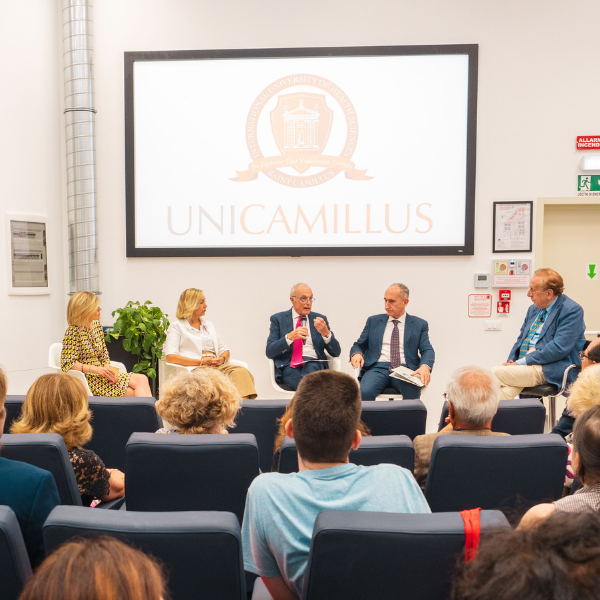The event, which is part of the University’s Third Mission (TM), was conceived by Prof. Donatella Padua (delegate for the Third Mission at UniCamillus) and took place at the UniLabs facility of the International Medical University of Rome. In the presence of distinguished guests, including the well-known television host Michele Mirabella, who moderated the debate among the participants, the role of medical universities in promoting the well-being of communities and territories was explored. The discussions involved the Rector of UniCamillus, Prof. Gianni Profita, the President of ANVUR (National Agency for the Evaluation of the University and Research System), Antonio Uricchio, the Rector of the University of Tor Vergata, Nathan Levialdi Ghiron, Doctor. Sandra Romagnosi from the Organisational Unit of ANVUR for the Third Mission, and Doctor. Mariella Mainolfi, General Director of Health Professions at the Ministry of Health.
“It is absolutely necessary to consider the opening of universities to society,” continued Rector Profita, “We must not be an ivory tower of research and teaching. We must live in the city that surrounds us. And in this sense, we are absolutely delighted that the entire area along Via Tiburtina, where we are located, thrives with us, and in turn, we benefit from the activities of the neighborhood.”
Following the institutional greetings from the Rector, Prof. Uricchio added, “I am very pleased that today we are addressing the theme of inclusive medicine and the third mission because this topic is still unexplored in its many dimensions, which go beyond the residual sense of ‘everything that is not teaching.’ The sense of community, which is inherent to the university institution, entails dealing with and primarily focusing on the relationship with society itself.”
In this regard, UniCamillus‘s activities, which are known for their humanitarian focus, were referenced several times in the debate on inclusivity and positive social impact. This started with the evaluative report presented by Doctor Romagnoli, who also explained how the analytical and evaluative criteria for quality processes and internal organisational culture in universities have evolved in recent years. The promotion of inclusive medicine, as noted, along with education for prevention, is one of the “health for all” goals proposed in the United Nations’ Agenda 2030.
After the presentation of the data, the guests engaged in a roundtable discussion on the main topics addressed. “The concept of inclusion doesn’t only concern minorities but should also be oriented towards situations of social vulnerability,” said Doctor Mainolfi. “Inclusion implies openness and an exchange of visions and culture, and in this sense, it should represent an added value.” Prof. Levialdi Ghiron further emphasized the important collaborative link that can be established between universities and the Ministry of Health “to specifically care for the most vulnerable population groups and make a significant contribution to society.” The Third Mission, Prof. Padua continued, “is the propensity of institutions to be open to the outside, which needs to be understood, discovered, and valued.”
Prof. Paolo Miccoli, Vice-Rector for Institutional Relations at UniCamillus, summed up the debate by emphasising that “healthcare should not be seen as a cost for the state. On the contrary, healthcare can generate wealth, primarily social wealth.” It is in this direction that UniCamillus intends to continue its commitment, increasingly contributing to the improvement of the well-being of all the social contexts it engages with through its various activities.















